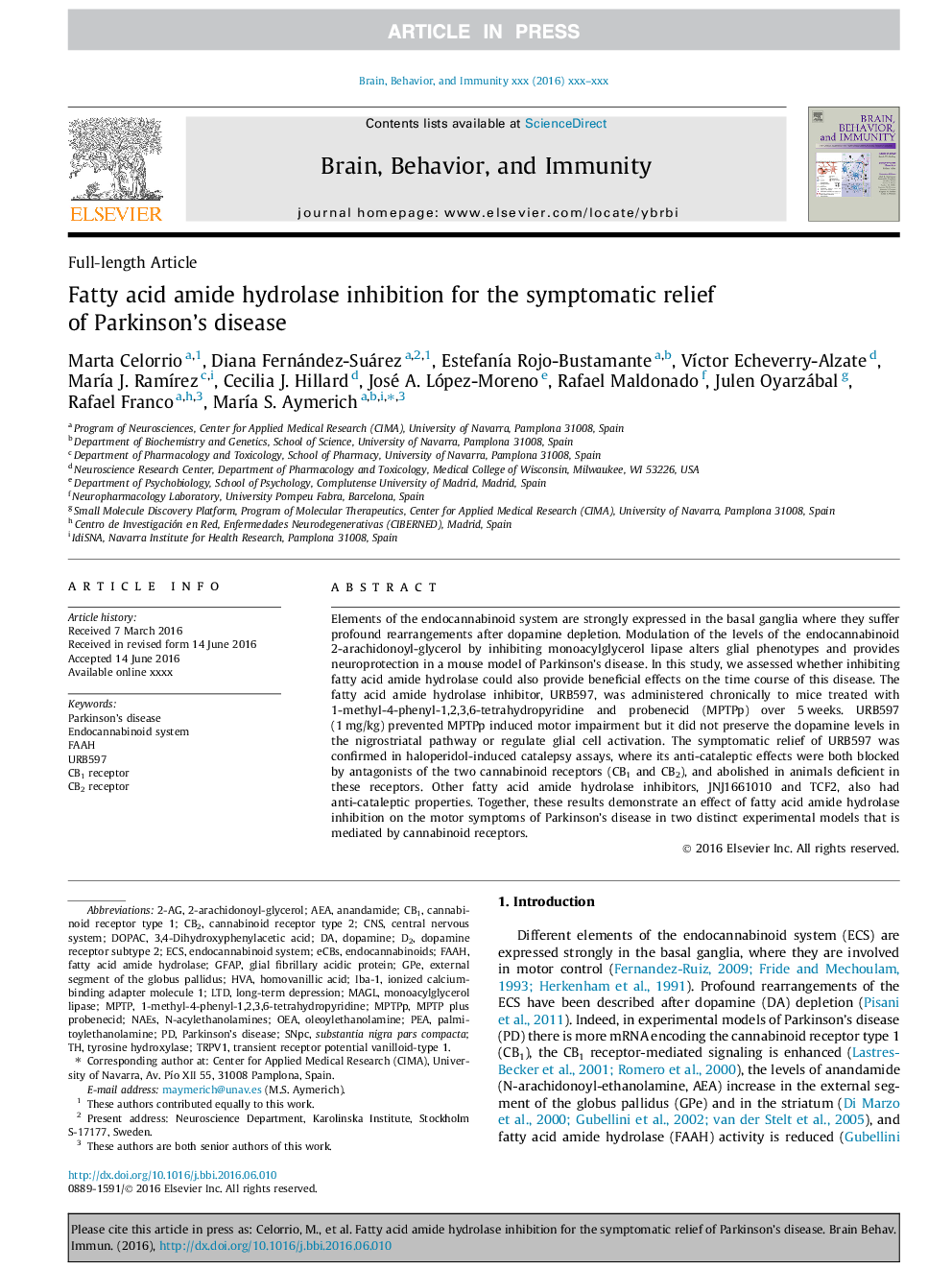| کد مقاله | کد نشریه | سال انتشار | مقاله انگلیسی | نسخه تمام متن |
|---|---|---|---|---|
| 5041013 | 1473910 | 2016 | 12 صفحه PDF | دانلود رایگان |
عنوان انگلیسی مقاله ISI
Fatty acid amide hydrolase inhibition for the symptomatic relief of Parkinson's disease
ترجمه فارسی عنوان
مهار اسید آمید هیدرولاز اسید چرب برای کاهش علائم بیماری پارکینسون
دانلود مقاله + سفارش ترجمه
دانلود مقاله ISI انگلیسی
رایگان برای ایرانیان
کلمات کلیدی
MPTPURB5972-arachidonoyl-glyceroleCBsexternal segment of the globus pallidusCB2FAAHDOPACCB1magl2-AGN-acylethanolaminesNAEsTRPV1GPEAEAGFAPPEA1-methyl-4-phenyl-1,2,3,6-tetrahydropyridine - 1-methyl-4-phenyl-1،2،3،6-tetrahydropyridine3,4-dihydroxyphenylacetic acid - 3،4-دی هیدروکسی فنیل اسیدهای اسیدECs - EC هاIba-1 - IBA-1OEA - OASSNpc - SNPCanandamide - آناندامیدFatty acid amide hydrolase - اسید آمینه هیدرولاز اسید چربlong-term depression - افسردگی طولانی مدتendocannabinoids - اندوکانبایوئید هاParkinson’s disease - بیماری پارکینسونsubstantia nigra pars compacta - توده سیاه پارس متراکمtyrosine hydroxylase - تیروزین هیدروکسیلازCNS - دستگاه عصبی مرکزیDopamine - دوپامینendocannabinoid system - سیستم اندوکانبینیدcentral nervous system - سیستم عصبی مرکزیmonoacylglycerol lipase - لیپاز monoacylglycerol لیپازLTD - محدودionized calcium-binding adapter molecule 1 - ملکول آداپتور اتصال دهنده کلسیم یونیزه 1cannabinoid receptor type 1 - نوع گیرنده کانابینوئید 1homovanillic acid - هومووانیلیک اسیدGlial fibrillary acidic protein - پروتئین اسیدی فیبریلاسیون گلایالHVA - چهCB1 receptor - گیرنده CB1CB2 receptor - گیرنده CB2cannabinoid receptor type 2 - گیرنده کانابینوئید نوع 2
موضوعات مرتبط
علوم زیستی و بیوفناوری
ایمنی شناسی و میکروب شناسی
ایمونولوژی
چکیده انگلیسی
Elements of the endocannabinoid system are strongly expressed in the basal ganglia where they suffer profound rearrangements after dopamine depletion. Modulation of the levels of the endocannabinoid 2-arachidonoyl-glycerol by inhibiting monoacylglycerol lipase alters glial phenotypes and provides neuroprotection in a mouse model of Parkinson's disease. In this study, we assessed whether inhibiting fatty acid amide hydrolase could also provide beneficial effects on the time course of this disease. The fatty acid amide hydrolase inhibitor, URB597, was administered chronically to mice treated with 1-methyl-4-phenyl-1,2,3,6-tetrahydropyridine and probenecid (MPTPp) over 5Â weeks. URB597 (1Â mg/kg) prevented MPTPp induced motor impairment but it did not preserve the dopamine levels in the nigrostriatal pathway or regulate glial cell activation. The symptomatic relief of URB597 was confirmed in haloperidol-induced catalepsy assays, where its anti-cataleptic effects were both blocked by antagonists of the two cannabinoid receptors (CB1 and CB2), and abolished in animals deficient in these receptors. Other fatty acid amide hydrolase inhibitors, JNJ1661010 and TCF2, also had anti-cataleptic properties. Together, these results demonstrate an effect of fatty acid amide hydrolase inhibition on the motor symptoms of Parkinson's disease in two distinct experimental models that is mediated by cannabinoid receptors.
ناشر
Database: Elsevier - ScienceDirect (ساینس دایرکت)
Journal: Brain, Behavior, and Immunity - Volume 57, October 2016, Pages 94-105
Journal: Brain, Behavior, and Immunity - Volume 57, October 2016, Pages 94-105
نویسندگان
Marta Celorrio, Diana Fernández-Suárez, EstefanÃa Rojo-Bustamante, VÃctor Echeverry-Alzate, MarÃa J. RamÃrez, Cecilia J. Hillard, José A. López-Moreno, Rafael Maldonado, Julen Oyarzábal, Rafael Franco, MarÃa S. Aymerich,
